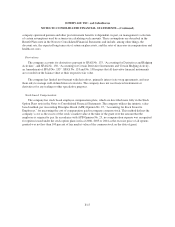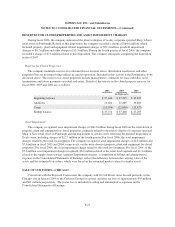Albertsons 2006 Annual Report Download - page 64
Download and view the complete annual report
Please find page 64 of the 2006 Albertsons annual report below. You can navigate through the pages in the report by either clicking on the pages listed below, or by using the keyword search tool below to find specific information within the annual report.SUPERVALU INC. and Subsidiaries
NOTES TO CONSOLIDATED FINANCIAL STATEMENTS—(Continued)
Comprehensive Income:
The company reports comprehensive income in accordance with SFAS No. 130, “Reporting Comprehensive
Income”. Comprehensive income refers to revenues, expenses, gains and losses that are not included in net
earnings but rather are recorded directly in stockholders’ equity in the Consolidated Statements of Stockholders’
Equity.
Use of Estimates:
The preparation of consolidated financial statements in conformity with accounting principles generally
accepted in the United States of America requires management to make estimates and assumptions that affect the
reported amounts of assets and liabilities and disclosure of contingent assets and liabilities at the date of the
financial statements and the reported amounts of revenues and expenses during the reporting period. Actual
results could differ from those estimates.
Reclassifications:
Certain reclassifications have been made to conform prior years’ data to the current presentation. These
reclassifications had no effect on reported earnings.
New Accounting Standards
In December 2004, the Financial Accounting Standards Board (“FASB”) issued FASB Statement 123
(Revised 2004), “Share-Based Payment.” This revised statement, which is effective for fiscal years beginning
after June 15, 2005, requires all share-based payments to employees to be recognized in the financial statements
based on their fair values. The company currently accounts for its share-based payments to employees under the
intrinsic value method of accounting set forth in Accounting Principles Board Opinion No. 25, “Accounting for
Stock Issues to Employees.” Additionally, the company complies with the stock-based employer compensation
disclosure requirements of SFAS No. 148, “Accounting for Stock-Based Compensation—Transition and
Disclosure, an amendment of FASB Statement No. 123.” The company plans to adopt the revised statement in its
first quarter of its fiscal year 2007, which begins on February 26, 2006. For previously issued awards, the
company will adopt SFAS 123(R) on a modified prospective basis and recognize compensation expense on the
unvested portion of the awards over the remaining vesting period. The company estimates that earnings per share
for the year ending February 24, 2007 will be reduced by approximately $0.10 per diluted share as a result of the
incremental compensation expense to be recognized from implementing SFAS No. 123(R). These estimates will
change if the company completes the Proposed Transaction as described above.
In December 2004, the FASB issued SFAS No. 153, “Exchanges of Nonmonetary Assets, an amendment of
APB Opinion No. 29” (“SFAS 153”). SFAS 153 amends Opinion 29 to eliminate the exception for nonmonetary
exchanges of similar productive assets and replaces it with a general exception for exchanges of nonmonetary
assets that do not have commercial substance. A nonmonetary exchange has commercial substance if the future
cash flows of the entity are expected to change significantly as a result of the exchange. The company is required
to adopt the provisions of SFAS 153 during the first quarter of fiscal year 2007, which begins on February 26,
2006. The provisions of SFAS 153 are not expected to have a material impact on the consolidated financial
statements.
In May 2005 the FASB issued SFAS No. 154, “Accounting Changes and Error Corrections—a Replacement
of APB Opinion No. 20 and FASB Statement No. 3” (“SFAS No. 154”). SFAS No. 154 requires retrospective
F-19
























